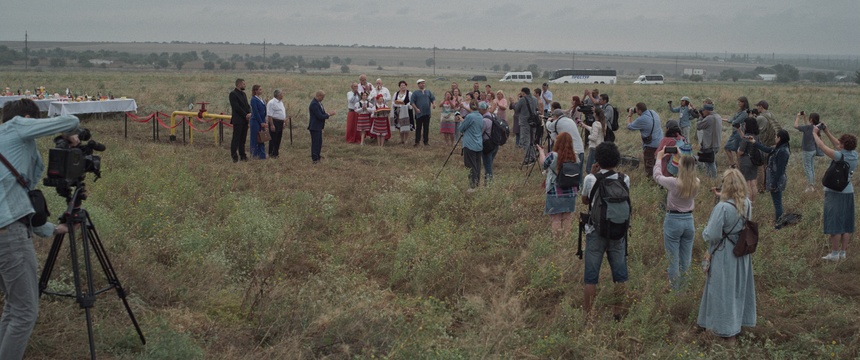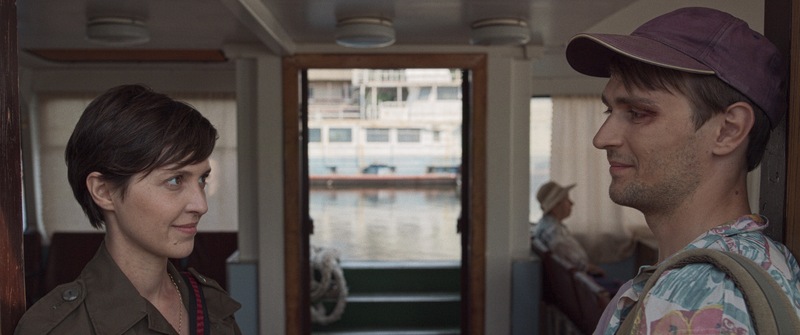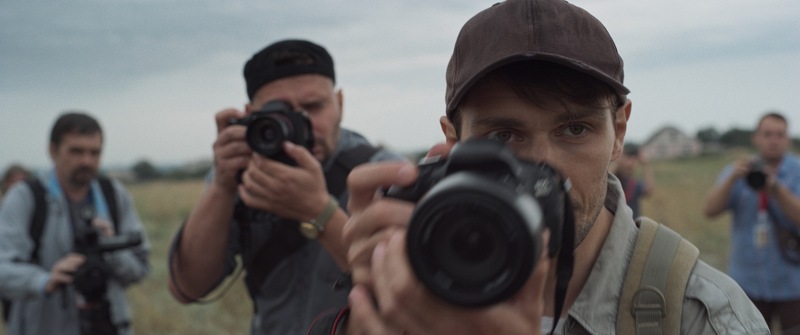Berlinale 2024 Review: THE EDITORIAL OFFICE, Or, THE GODFATHER for the Disinformation Age
Ukrainian filmmaker Roman Bondarchuk navigates the complex interplay of truth, justice, and media manipulation in his latest socio-political black comedy that veers into a surreal satire.

Established Ukrainian filmmaker Roman Bondarchuk makes a compelling return with a socio-political black comedy veering into satire in his latest offering, The Editorial Office, set amidst the untamed steppes of southern Ukraine.
This narrative embarks on a seemingly tranquil quest by a young nature researcher, Yura, and his seasoned colleague, to track down an endangered species of groundhog. However, their journey quickly descends into a whirlwind of surreal encounters.
Marking Bondarchuk's second venture into this locale, the film deftly explores the intricate landscapes of truth, justice, and identity against a backdrop fraught with the shadows of impending conflict, the menace of disinformation, and the scourge of political graft.
Following their unsettling discovery of a group of men igniting perilous fires in the forests, Yura seeks to expose this criminal activity, a pursuit that strays far from his idealistic expectations. The transgression is twisted into an alternate story, his senior colleague disappears, and local newspapers display a disturbing indifference to their findings.
Before long, Yura finds himself jobless, while his mother is forced to maintain a relationship with a disreputable local to support the family. Assuming the role of family provider, Yura secures a position at a local tabloid newspaper, harboring aspirations to effectuate change from within.
The Editorial Office redoes a classic tale of initiation, or rather, a political coming-of-age for Yura, who experiences firsthand the harsh realities of the world. Yura's journey is marked by a romantic idealism and a fervent yearning for justice, only to discover that justice is often manipulated by those in positions of political and economic power.
In collaboration with screenwriter Alla Tyutyunnik — Bondarchuk's mother and an erstwhile journalist herself — the film intricately weaves multiple sideplots, notably one concerning the forthcoming local election. What ensues is not merely grotesque news manipulation but a sequence of surreal and absurd events emblematic of an era riddled with hoaxes, fake news, and political subterfuges, all unfolding against the ominous backdrop of an impending war.
In a different era, The Editorial Office might have been dismissed as an overly exaggerated and unrealistic portrayal of the interplay between politics and media. However, in the context of today’s diverse media landscape, marked by the rise of alternative media, individual echo chambers, isolated social bubbles, and a pervasive conspiracy mindset, the film's dark satire veers closer to social realism.
It brings to mind the adage that to understand the workings of politics, one should read Mario Puzo's The Godfather. In a similar vein, Bondarchuk's The Editorial Office aims to elucidate the intricacies of political dynamics, albeit with a sense of levity that suggests, despite the dire circumstances depicted, the Ukrainian director has managed to inject an element of enjoyment into the narrative.
The Editorial Office unfolds like a road movie, with the protagonist navigating the city, moving from one character and institution to another. In this journey, Bondarchuk interweaves a romantic subplot that may seem somewhat contrived compared to the more compelling family drama central to the story.
Despite this, Bondarchuk successfully captures the zeitgeist, illustrating how individuals are lured into alternative realities through rather unsophisticated methods. In a previous era, The Editorial Office might have been dismissed as a grotesquely exaggerated parody. However, in the contemporary era, characterized by alternative facts, constant misinformation, the phenomenon of "red-pilling," and DIY psyops, the film's portrayal of reality is strikingly plausible.
Bondarchuk, while fully acknowledging the gravity of the themes he explores, does not shy away from employing a playful, tongue-in-cheek approach. Particularly notable is the film's conclusion, which veers from predictability into madness. Yet, within the context of the narrative's broader unfolding, this shift towards the surreal resonates as perfectly logical, serving as a fitting culmination to the journey the story charts.
Bondarchuk’s ability to blend serious social commentary with elements of humor and surrealism underscores the storytelling at play in The Editorial Office.
The Editorial Office
Director(s)
- Roman Bondarchuk
Writer(s)
- Dar'ya Averchenko
- Roman Bondarchuk
- Alla Tyutyunnik
Cast
- Dmytro Bahnenko
- Zhanna Ozirna
- Rimma Zyubina









